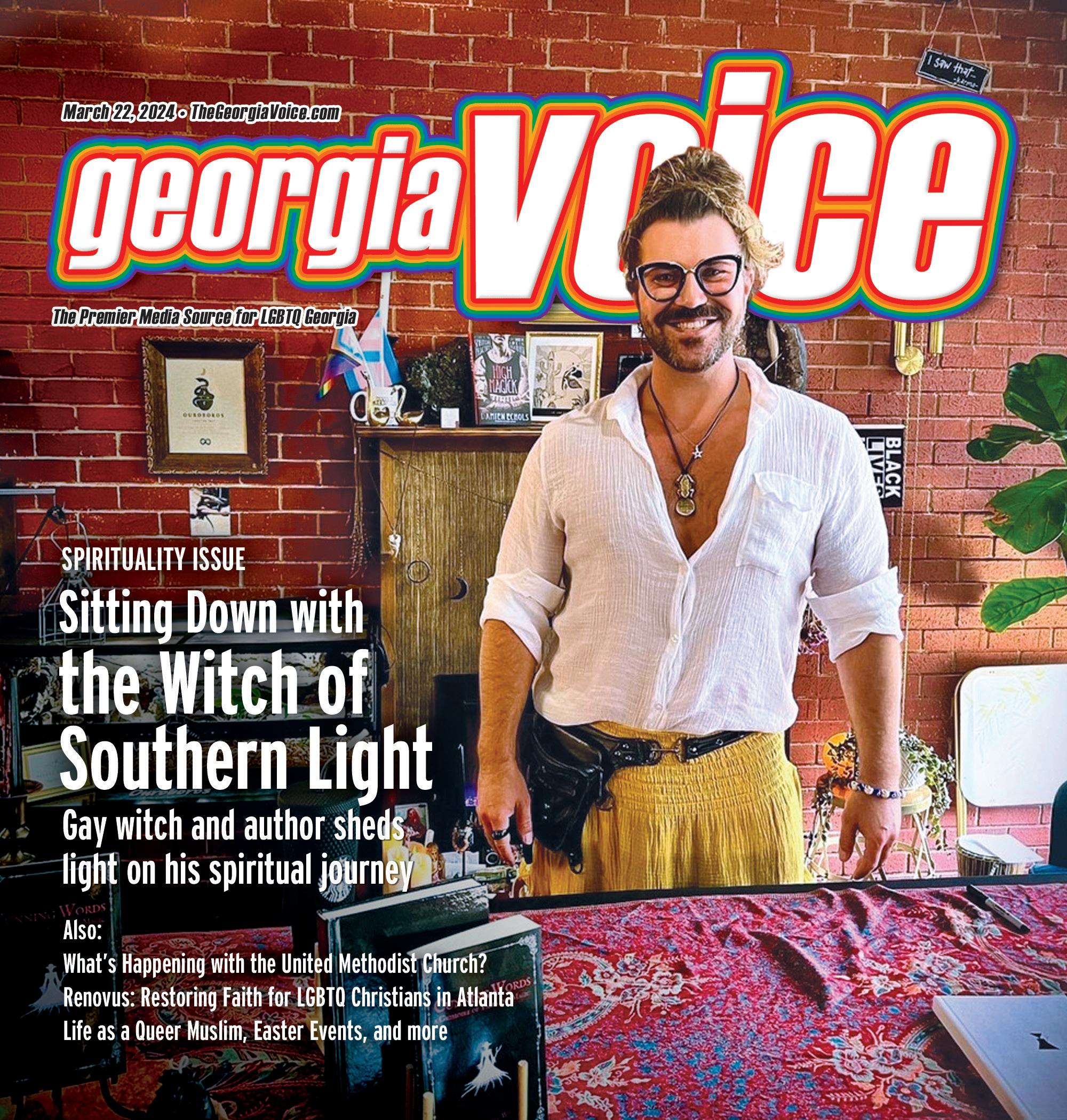

About the cover:
Courtesy photo
TheGeorgiaVoice.com
PO Box 77401 • Atlanta, GA 30357
P: 404-815-6941; F: 404-963-6365
Business Principal/Publisher: Tim Boyd tboyd@thegavoice.com
Editorial Editor: Katie Burkholder kburkholder@thegavoice.com
Editorial Contributors:
María Helena Dolan, Jim Farmer, Luke Gardner, Divine Ikpe, Lisa Keen, Gregg Shapiro, Adalei Stevens
Production Art Director: Rob Boeger rboeger@thegavoice.com
Sales Sales Executive: Dixon Taylor dtaylor@thegavoice.com
Sales Executive: Jim Brams jbrams@thegavoice.com
Sales Executive & Photographer: Russell Bowen-Youngblood russ@alphabetsoupmarketing.com
Business Advisor: Lynn Pasqualetti
Financial Firm of Record: HLM Financial Group
National Advertising: Rivendell Media • 908-232-2021 sales@rivendellmedia.com
Publisher Emeritus: Chris Cash
Fine Print All
 Katie Burkholder
Katie Burkholder
I have a confession: I am a non-Christian addicted to Christianity — or, rather, Christian imagery. I collect crucifixes. My budding collection consists of a white cross bearing a silver Jesus that I bought from an antique seller, two mini rosaries from St. George’s Chapel in Windsor, United Kingdom, a rosary I crocheted, a small glass cross statue, a ceramic crucifix from Mexico, two rosaries I wear as jewelry, and a combo rosary and prayer tattoo on my left arm (which I’m counting as part of the collection).
Like I said, I’m not a Christian, and while I have tried to be (by both my own hand and the more forceful hands of my devout peers), I never truly have been. When I left my conservative hometown to move to Atlanta, I quickly renounced the religion and chose a more humanist and alternative approach to spirituality. My 19-year-old self would probably be horrified to see all the crosses on my walls, but these symbols of reverence mean more to me than the religion that birthed them.
I collect crucifixes simply because they are beautiful. They are evocative of a Southern gothic brand of horror, a fearful protection against demonic evil that I find perverse and exciting. At the same time, they are also representative of loving sacrifice, reverence, and gratitude, all of which still make up my definition of God.
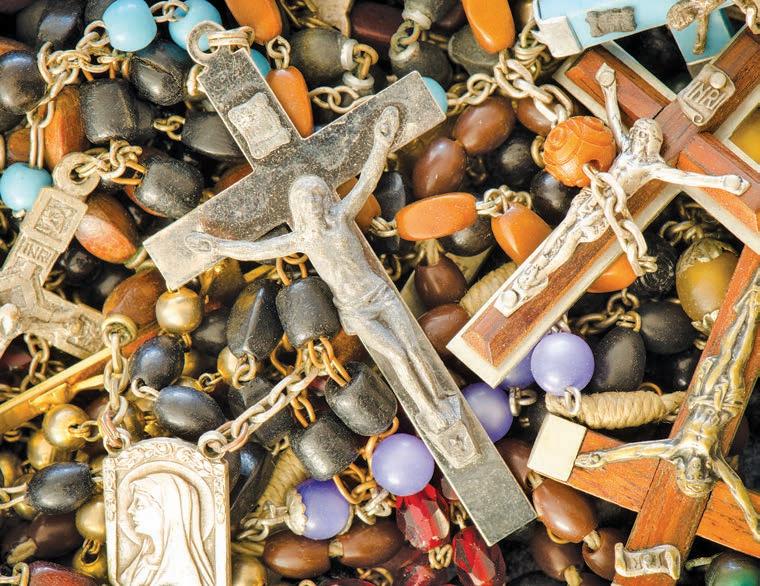
“I collect crucifixes simply because they are beautiful. They are evocative of a Southern gothic brand of horror, a fearful protection against demonic evil that I find perverse and exciting. At the same time, they are also representative of loving sacrifice, reverence, and gratitude, all of which still make up my definition of God.”




Along with my collection, I often turn to religious text and imagery when writing poetry or making collages, juxtaposing these images with overt sexuality to explore topics of domination and worship. And the truth is, I am more in awe of and devoted to God — my version of God — as an unapologetic blasphemer than I ever was while cosplaying as Christian at church and Bible studies as a teenager.
The God I am devoted to is my partner’s laugh, wet grass under my toes, and fruit juice running down my chin. God is tarot cards and debut novels and dried flowers. It’s my sister telling me secrets late at night and the maggots communing among the trash rot. It is everything that inspires awe in me, and everything that inspires disgust. It is neither heaven nor hell, but the Earth my feet are planted on.
As I have come to my own deeply personal
and meaningful conception of what God is, I have come to a place where I feel I can reclaim the reverence and beauty of Christianity. As a queer Southern woman, I know it is mine to take for my own, to reimagine in my image — in God’s image. People may assume I’m Christian because I have a cross around my neck, but they will not know the truth of my secret power. I do not worship Jesus or believe in eternal punishment, but the cross is just as much mine as anybody else’s.
THEGEORGIAVOICE.COM MARCH 22, 2024 EDITORIAL 3 EDITORIAL
material in Georgia Voice is protected by federal copyright law and may not be reproduced without the written consent of Georgia Voice. The sexual orientation of advertisers, photographers, writers and cartoonists published herein is neither inferred nor implied. The appearance of names or pictorial representation does not necessarily indicate the sexual orientation of that person or persons. We also do not accept responsibility for claims made by advertisers. Unsolicited editorial material is accepted by Georgia Voice, but we do not take responsibility for its return. The editors reserve the right to accept, reject, or edit any submission. Guidelines for freelance contributors are available upon request. A single copy of Georgia Voice is available from authorized distribution points. Multiple copies are available from Georgia Voice office only. Call for rates. If you are unable to reach a convenient free distribution point, you may receive a 24-issue mailed subscription for $149 per year. Checks or credit card orders can be sent to Tim Boyd, tboyd@thegavoice.com Postmaster: Send address changes to Georgia Voice, PO Box 77401, Atlanta, GA 30357. Georgia Voice is published twice a month by Georgia Voice, LLC. Individual subscriptions are $149 per year for 24 issues. Postage paid at Atlanta, GA, and additional mailing offices. The editorial positions of Georgia Voice are expressed in editorials and in editor’s notes. Other opinions are those of the writers and do not necessarily represent the opinion of Georgia Voice and its staff. To submit a letter or commentary: Letters should be fewer than 400 words and commentary, for web or print, should be fewer than 750 words. Submissions may be edited for content and length, and must include a name, address, and phone number for verification. Email submissions to editor@thegavoice.com or mail to the address above. Join us online: facebook.com/thegavoice twitter.com/thegavoice instagram.com/thegeorgiavoice youtube.com/user/GAVoice georgiavoice VOLUME 15• ISSUE 1 A Collection of Crucifixes PHOTO BY SHUTTERSTOCK.COM/LOST MOUNTAIN STUDIO


Read these stories and more online at thegavoice.com
Supreme Court Declines to Hear Case over Drag Show at Texas University
The U.S. Supreme Court on Friday declined to hear a First Amendment case over a public university president’s refusal to allow an LGBTQ student group to host a drag show on campus.
The group’s application was denied without the justices providing their reasoning or issuing dissenting opinions, as is custom for such requests for emergency review.
When plaintiffs sought to organize the drag performance to raise money for suicide prevention in March 2023, West Texas A&M University President Walter Wendler cancelled the event, citing the Bible and other religious texts.
The students sued, arguing the move constituted prior restraint and viewpointbased discrimination, in violation of the First Amendment. Wendler had called drag shows “derisive, divisive and demoralizing misogyny,” adding that “a harmless drag show” was “not possible.”
The notoriously conservative Judge Matthew Kacsmaryk, who former President Donald Trump appointed to the U.S. District Court for the Northern District of Texas, ruled against the plaintiffs in September, writing that “it is not clearly established that all drag shows are inherently expressive.”
Kacsmaryk further argued that the High Court’s precedent-setting opinions protecting stage performances and establishing that “speech may not be banned on the ground that it expresses ideas that offend” was inconsistent with constitutional interpretation based on “text, history and tradition.”
Plaintiffs appealed to the 5th U.S. Circuit Court of Appeals, which is by far the most conservative of the nation’s 12 appellate circuit courts. They sought emergency review by the Supreme Court because the 5th Circuit refused to fast-track their case, so
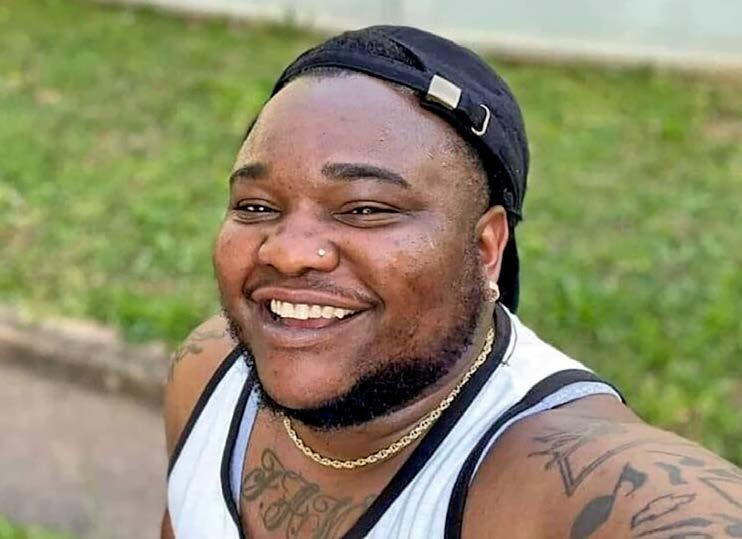
arguments were scheduled to begin after the date of their drag show.
Mother of Righteous Torrence “TK” Hill Reveals Motive, Identifies Suspect in ATL Black Trans Murder
In the days following the February 28 shooting of Righteous Torrence “TK” Hill, 35, a well-known and beloved Atlanta LGBTQ salon owner, details surrounding what led an unnamed gunman to open fire, shooting Hill multiple times in the front entrance of his East Point home resulting in his death, were non-existent until now.
Hill’s gender identity as a trans man amid an epidemic of Black trans violence led to online speculation that anti-trans hatred may have played a role in his murder. Hill’s mother, Verna Hill Wilcox, tells GLAAD the gunman murdered her son because of hate, “but it was not because he was transgender.” Wilcox also reveals the gunman’s identity, the victim’s cousin, Jaylen Hill, 22. Wilcox says Jaylen was “floating” between his mother’s Atlanta and TK’s East Point residences.
GLAAD spoke with Verna Hill Wilcox about her son TK and the tragic events that led up to his murder. By all accounts, he flourished as a business owner, providing a safe space for the most marginalized in a revered Black institution—the barbershop. TK was loved unconditionally as his authentic self by family, friends, colleagues, and his partner. Still, in the end, he was not immune to other ravages in the community, including gun
violence and mental health distress.
Wilcox said TK and his partner Terri Wilson, 41, were invested in stabilizing their cousin Jaylen.
“TK had finally reached a point where it was like, no matter what we do for you, you still have a sense of entitlement, and you’re not showing us the respect and love we’re showing you,” she said.
Wilcox believes the sense of entitlement Jaylen felt reached a boiling point when her son found himself on the opposite end of Jaylen’s gun on the night of February 28.
“TK got into a verbal altercation with Jaylen,” Wilcox said. “He was chastising him for using their stuff. Terri let them use their vehicle, and he stayed gone for four hours. When he came back, he had an attitude about somebody else’s merchandise, and TK reprimanded him for that and told him to leave… TK had a right to be angry. He had a right to tell him to get out of the house. TK had a right to tell him no; we won’t tolerate this behavior.”
Jaylen Hill is the only suspect in the case and is currently a fugitive. Wilcox says the East Point Police Department has asked the family not to release his image online or to the media, but if anyone knows his whereabouts, they should contact Det. R. Graham at East Point Police.
This article was originally published by GLAAD and republished with permission.
4 NEWS MARCH 22, 2024 THEGEORGIAVOICE.COM
reports
Staff
NEWS BRIEFS
Righteous Torrence “TK” Hill PHOTO VIA FACEBOOK


March 22–24, 2024





World premieres by Garrett Smith and Sergio Masero, with a modern favorite by Mark Morris.








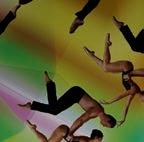











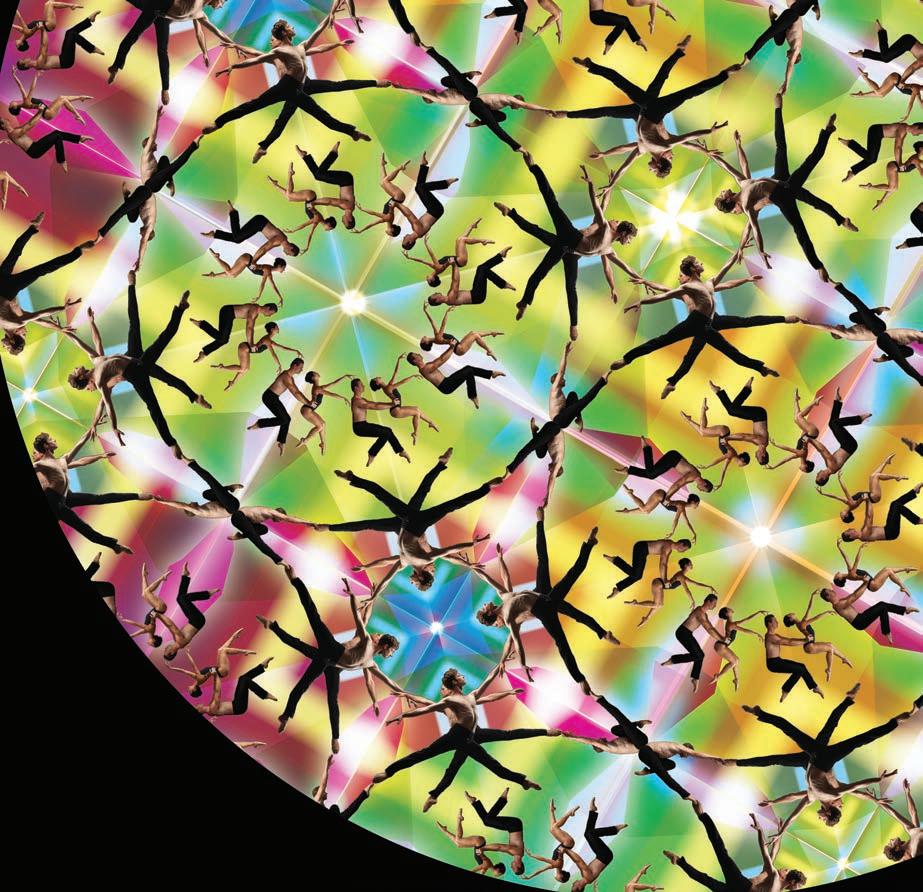
There’s a kaleidoscope of color, sound and movement on the horizon at Atlanta Ballet!
Supported by
Visit atlantaballet.com for tickets
Thomas Davidoff, Benjamin Kuefl er, Fuki Takahashi. Photos by Rachel Neville.
An LGBTQ Supreme Court Update
Lisa Keen
Read the full story online at thegavoice.com. More than halfway through its 2023-24 session, the U.S. Supreme Court has dispensed with three appeals in ways that help LGBTQ people. But it’s a long way to Tipperary, and as many as seven other petitions are awaiting action before the justices, some scheduled for conference this week.
LGBTQ legal activists will be listening intently March 26 as the U.S. Supreme Court hears oral arguments in two consolidated appeals to determine whether courts can pull the early-stage abortion drug RU-486 (aka mifepristone) off the market. Lambda Legal and other LGBTQ groups have long warned that any damage done to the right to have an abortion could have deep implications for the right to have intimate relations, including marriage, for LGBTQ people. How the high court rules in the mifepristone case (Food and Drug Administration v. Alliance for Hippocratic Medicine) could negatively impact the availability of HIV prevention medication, IVF services for lesbian couples, and medical treatment for transgender people.
Other LGBTQ-related cases before the Supreme Court this session –some concluded, some pending— include:
Campus hate speech: Good, for now. In what appears to have been a 6-to-2 vote, the Supreme Court on March 3 granted a petition of appeal challenging a policy against hate speech on the campus of Virginia Tech. Without argument, the court vacated the Fourth Circuit U.S. Court of Appeals decision with instructions to dismiss the lawsuit as moot (because the school had significantly pared back its protocol for addressing hate speech on campus). Justice Clarence Thomas, with his plus-one Justice Samuel Alito, dissented. Of the 10 friend-of-the-court briefs submitted, all were in support of the Speech First effort. (Speech First v. Virginia Tech)
Bathroom ban: Good. In January, the
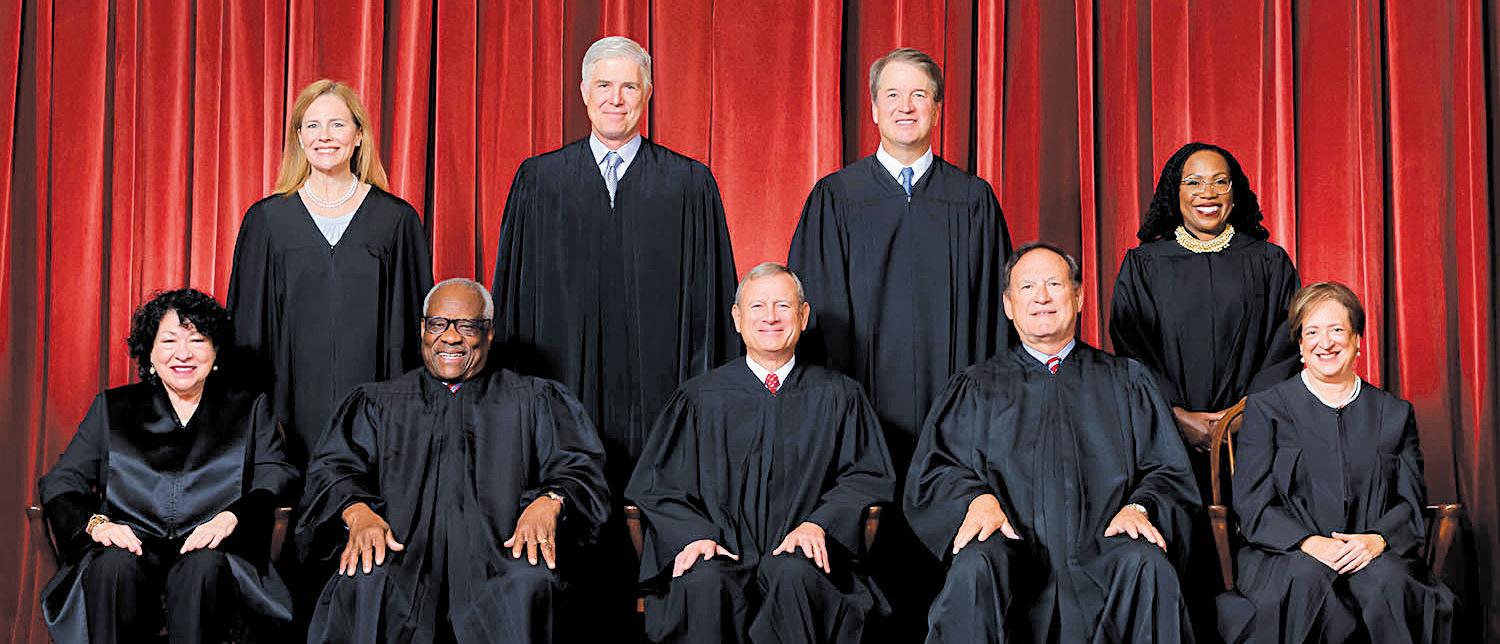
U.S. Supreme Court denied a request from an Indiana school district that sought to require transgender students to use a separate bathroom from other students. The middle school student at the center of the controversy challenged the ban on the basis of equal protection and Title IX, saying the laws essentially create “a single national policy” that prohibits the bathroom ban. On January 16, without comment or dissent, the Supreme Court denied the school district’s appeal. (Martinsville v. A.C.)
Conversion therapy: Good. In a 6-to-3 vote, the U.S. Supreme Court on December 11 rejected the appeal of a therapist who challenged a Washington State law prohibiting “conversion therapy” for anyone under 18. In rejecting the appeal, the court left intact a Washington Supreme Court ruling that upheld the law, similar to laws in 19 other states. (Tingley v. Washington)
Fighting bathroom ban: Pending. Three transgender adolescents in Tennessee have filed an appeal with the Supreme Court, seeking to reverse a Sixth Circuit ruling that upheld a ban on gender-affirming medication. “Gender dysphoria is a serious medical condition that, if left untreated, can
result in severe anxiety and depression, selfharm, and even suicide,” says the petition of appeal, filed by the ACLU and the National Center for Lesbian Rights. (L.W. v. Tennessee)
Pronoun v. parents: Pending. A couple in Indiana who say their Christian beliefs hold that god “creates each person as immutably male or female,” and they refuse to refer to their “biological male” child with female pronouns as the child wishes. The Indiana Department of Child Services removed the child from the parents’ home, noting the child had developed an eating disorder as a result of the conflict with the parents, and state courts, including the Indiana Supreme Court, upheld that action. The child has since turned 18, potentially rendering the case moot. (M.C. v. Indiana)
Fighting for parental rights. Pending. In this appeal, the ACLU and the National Center for Lesbian Rights is challenging a state law passed last year by Kentucky to ban the use of medical treatments to alter the appearance of a minor from the gender the child was identified at birth to the gender the child identifies with now. The Sixth Circuit U.S. Court of Appeals upheld the state’s ban, but seven transgender young people and their parents are fighting
that ruling. The NCLR/ACLU brief said the ban on certain transgender medical care is “so departed from our country’s traditional respect for parents’ rights and responsibilities” and singles out “a vulnerable and politically unpopular group for disfavored treatment.” (Jane Doe 1 v. Kentucky)
Fighting treatment: Pending. Idaho has asked the Supreme Court for an emergency stay of a lower court decision preventing the state from enforcing its ban on medical treatment for transgender youth. The question as to whether that ban violates the U.S. constitution is currently before the Ninth Circuit. (Idaho v. Poe)
Reverse discrimination: Pending. A straight woman in Ohio is appealing her case to seek a declaration of sexual orientation discrimination when the supervisor at her job twice passed her over for promotions and chose gay employees instead. The straight employee was eventually fired by two straight employees. The Sixth Circuit U.S. Court of Appeals ruled she had not made the necessary showing that the negative employment decisions were based on her sexual orientation. She is now appealing that decision to the U.S. Supreme Court. (Ames v. Ohio).
6 NEWS MARCH 22, 2024 THEGEORGIAVOICE.COM NEWS
U.S. Supreme Court Justices PHOTO BY FRED SCHILLING, COLLECTION OF THE SUPREME COURT OF THE UNITED STATES



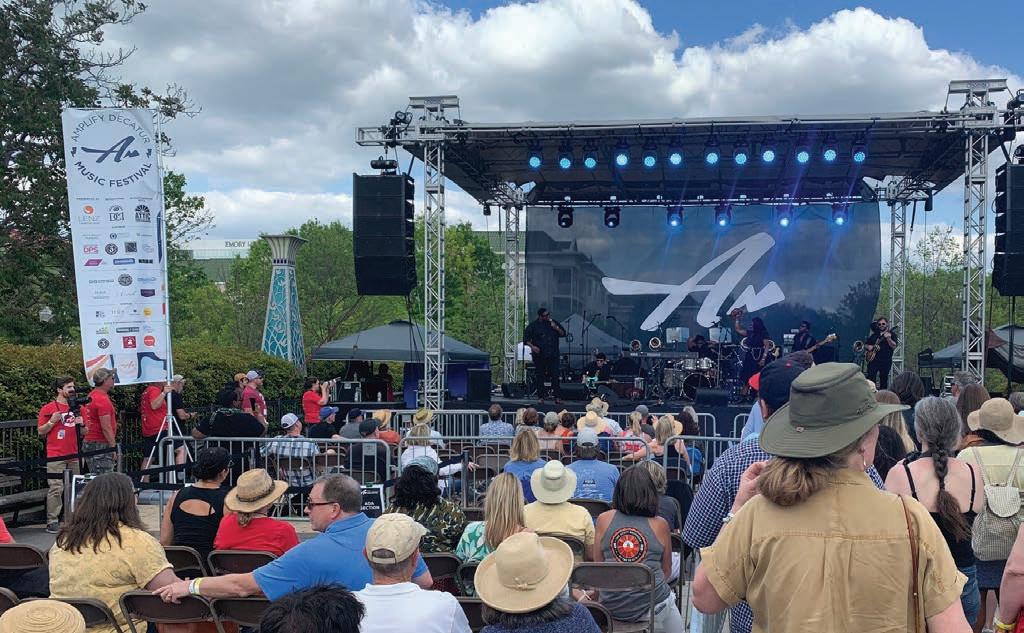

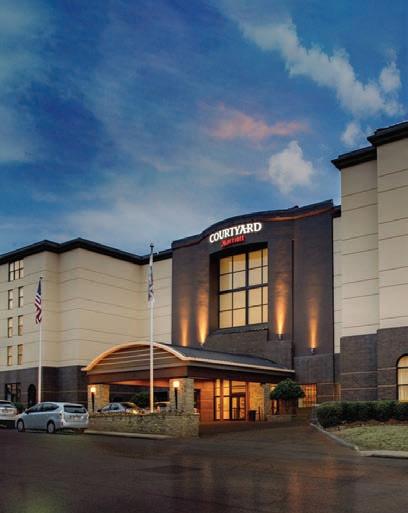
Kimball House The Deer and the Dove in DECATUR Warm welcomes, good times visitdecaturga.com VISITORS CENTER • 113 Clairemont Ave. Decatur 30030 MAKE IT A STAY! HAMPTON INN & SUITES 116 Clairemont Ave. COURTYARD BY MARRIOTT 130 Clairemont Ave. MUSIC , DRINKS + DINNER
Melissa
Amplify Decatur April 13
Grammy Award winner
Etheridge headlines
Easter Events
Katie Burkholder
From church and brunch to drag and T dances, Easter weekend offers something for everybody, regardless of what you believe!
For Faith
Picnic and Easter Egg Hunt
MARCH 24
CHURCH AT PONCE AND HIGHLAND
The Church at Ponce & Highland is inviting neighbors to stop by their picnic and Easter Egg Hunt on Palm Sunday (the week before Easter) at noon. They will have food and an egg hunt on the enclosed playground for the little ones – all are welcome!
Advice for a Happy Life
EASTER SUNDAY
KADAMPA MEDITATION CENTER
Spiritual but not Christian? Join American Buddhist nun Kelsang Dechok this Sunday – or any Sunday – for practical talks, guided meditation, and discussion. No experience necessary – everybody is welcome! $15.
Praise and Worship
EASTER SUNDAY
THE GATHERING PLACE
Join in person or on Facebook Live at 11am.
Resurrection Sunday
EASTER SUNDAY
VISION CATHEDRAL
Begins at 10:45am.
Sunday Morning Prayer
EASTER SUNDAY
NEW COVENANT CHURCH OF ATLANTA
Enjoy the Sunday morning prayer at 9:45am before the worship service at 11am.
For Fun
Annual Easter Drag Races
MARCH 30
HERETIC
The Armorettes host their famous yearly Easter event yet again! The bar opens at 3pm,
and the games start at 4pm. This year brings new games, but also the classics, including the Easter Bonnet Contest – plus special guests Ruby Redd, Kellie Divine, and Lori Divine.
Bottom’s Up! Drag Brunch with Loosey LaDuca and Amanda Tori Meating
EASTER SUNDAY
CITY WINERY
WUSSY Mag presents this boozy drag brunch featuring special guests Loosey LaDuca & Amanda Tori Meating from “RuPaul's Drag Race”! The show starts at 12:30pm and includes performances by Nicole Paige Brooks, Chucky Deville, Dotte Com, and Miss He! Tickets at citywinery.com.
Easter Afternoon Tea
MARCH 30 AND EASTER SUNDAY
THE ST. REGIS
Afternoon tea at the St. Regis promises a wanderlust experience with delicious decadents, elegant loose-leaf tea, and handcrafted cocktails from 12:30 to 3:30pm. Each reservation will also be in the running for a golden ticket that reveals an extra special prize! Invite your best luminaries to the party and enhance your culinary experience with champagne and caviar service from Chef Bermyson Dorvil. Reserve your spot for $100 per person at exploretock.com/stregisatl.
Easter Brunch at Park Tavern
Experience a delightful brunch set up with chef-attended stations complete with all your brunch favorites – plus all-you-can-sip mimosas – overlooking the Midtown Skyline and Piedmont Park! Reserve your spot for $59.95 at parktavern.com/parktavern-event/ easter-brunch.
Easter Brunch at Le Bilboquet
Celebrate Easter at Le Bilboquet with a French-inspired three-course prix fixe brunch or dinner menu, crafted by executive chef Cyrille Holota. Highlights of the menu include smoked salmon, lamb tenderloin, spring risotto, ratatouille basil omelets, warm chocolat fondant, and so much more!
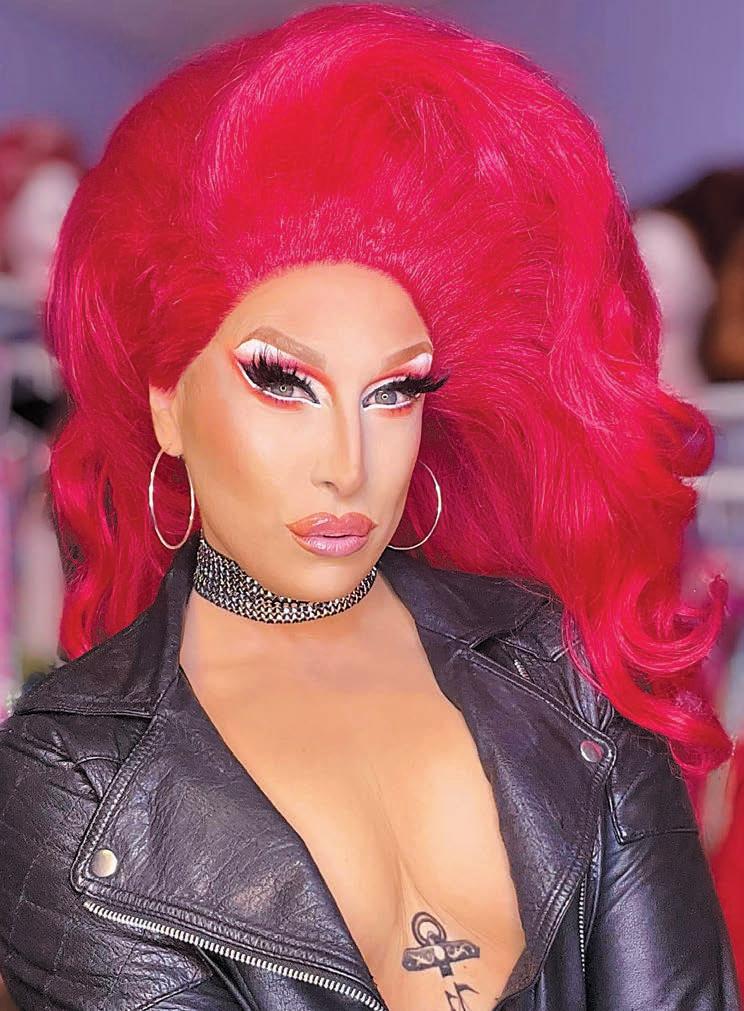

Reservations are $84 per person and can be made by calling 404-869-9944.
Easter Brunch at Livingston
Indulgence meets tradition in a grand brunch spread at Livingston in the Georgian Terrace Hotel from 11am to 4pm. Highlights of this culinary adventure include eggs benedict, eastern oysters, fourcheese macaroni and cheese, pan-seared sea bass, ham and prime rib carving stations, and delectable desserts – plus appearances from the Easter Bunny and live music and entertainment! Reserve your spot for $95 per person at livingstonatl.com.
Easter Brunch at New Realm
Join New Realm Brewing at 11am for a funfilled day of a delicious buffet, drinks, and a special appearance by the Easter Bunny!
Food includes chicken and waffles, an omelet station, a pancake bar, danishes and fruit, and so much more. Tickets via Eventbrite.
Easter Bunny
Sock Hop Tea Dance
EASTER SUNDAY
ATLANTA EAGLE
Head over to the Eagle at 4pm for an Easter day party with DJ Neon the Glowgobear! Take a break from the family, don your short shorts and high socks, and join in on the frisky old-fashioned Sock Hop.
Easter Thumpers and Bumpers
EASTER SUNDAY
ATLANTA EAGLE
Parking lot drag, brunch, a bar, and a T dance – what more do you want from an Easter afternoon? The party starts at 2pm.
8 COMMUNITY MARCH 22, 2024 THEGEORGIAVOICE.COM
COMMUNITY
WUSSY Mag presents this boozy drag brunch featuring special guests Loosey LaDuca (pictured above) and Amanda Tori Meating (inset) from “RuPaul's Drag Race”! PHOTOS VIA FACEBOOK

What’s Happening with the United Methodist Church?
For the past several years, the United Methodist Church has been divided on LGBTQ issues. In 2020, Asbury Memorial Church in Savannah, Georgia, was the first in the country to leave the denomination after the judicial council of the UMC voted in 2019 to uphold a ban on same-sex marriage and the ordination of “self-avowed, practicing homosexuals.”
However, at the end of 2023, 25 percent of churches had disaffiliated with the UMC –for the exact opposite reason. According to AP, the vast majority of the churches who left the denomination were conservativeleaning and responding to what they saw as the UMC’s failure to enforce the same bans that caused Asbury to leave. While the UMC does still ban same-sex marriage and openly LGBTQ clergy, there has been significant defiance to those bans, which motivated conservative churches to launch the separate Global Methodist Church – where most of the newly disaffiliated churches are expected to turn. The mass exodus in November was set into motion in response to a deadline set after the 2019 vote, which allowed congregations to leave by the end of 2023.
Most of the UMC disaffiliations are in the South, with Southeastern jurisdictions accounted for 50 percent of all disaffiliations and South Central jurisdictions making up 21 percent, according to a report from the Lewis Center for Church Leadership. Furthermore, most of the disaffiliating churches were majority white; 97.4 percent of the disaffiliations were majority white, while the UMC in 2019 before the mass exodus consisted of 89.6 percent majority white churches. Only 19 percent of the disaffiliating churches had a woman as lead pastor, despite making up 29 percent of the

denomination prior to the split.
In the North Georgia United Methodist Conference, more than 260 of the around 700 churches have left – about 41 percent of the conference. South Georgia and North Georgia were among the top ten conferences losing the most churches, with the South Georgia conference experiencing 50 percent of its churches leaving – tied for the third highest rate in the country with Texas (50 percent) and following North Alabama (52 percent) and Northwest Texas (81 percent).
Jordan Thrasher, the senior pastor at Embry Hills UMC, told 11 Alive that it was “the biggest” exodus he’s seen in the denomination.
The mass exodus may pose financial issues for the UMC. While the sizes of the remaining and leaving churches are about the same –a median of around 38 members for both – five percent of the disaffiliating churches had an average worship attendance of more than 250, which means a significant budget cut in 2024 and beyond, despite departing congregations paying for their properties and other financial obligations.
However, the future of the denomination is bright for queer Methodists. The more progressive churches who have remained in the UMC are expected to advocate for removing the ban on same-sex marriage
PHOTO BY PEXELS.COM
and LGBTQ clergy at the denomination’s general conference (the first denominationwide gathering in eight years), which starts April 23 in Charlotte, North Carolina. Russell, the President of the Board of Directors at Renovus, an organization for LGBTQ Christians (which you can learn more about on page 12), told 11 Alive that he hopes the exodus of more conservative churches encourages more queer believers to attend church – and that displaced members turn to Renovus.
“We would just hope that churches choose love,” he said. “We feel like that’s what Jesus chose.”
10 COMMUNITY MARCH 22, 2024 THEGEORGIAVOICE.COM
Katie Burkholder
COMMUNITY
The Witch of Southern Light Sheds Light on His Spiritual Journey
Luke Gardner
In 2020, you may have seen a viral TikTok video about how everyday actions can closely resemble witchcraft, like blowing out candles or chanting rhymes. That was the Marshall, the Witch of Southern Light’s first viral video, symbolizing a new chapter in both his spirituality and career.
Marshall’s entrance into the metaphysical started as a solitary Wicca practice in adolescence.
“I discovered witchcraft before I knew I was gay,” he told Georgia Voice. “I was in sixth grade, and I found the witchcraft section at the bookstore. This was back in the ’90s, and I was amazed by these books talking about the spirituality around being a witch. As a young teen, I found Silver Ravenwolf’s ‘Teen Witch,’ ‘Raymond Buckland's Complete Book of Witchcraft,’ and [several works] by Scott Cunningham.”
These authors are still recognized by many as pioneers of magic in modern times. In stark contrast from the ’90s, the 2010s saw the mainstreaming of witchcraft and new age spiritualities.
“I was a practicing witch all my teenage years,” Marshall said. “In my twenties, I went through [a time of] atheism, and by my late twenties and early thirties, I started to become more exploratory and touched into my witchcraft roots.”
This is when Marshall began exploring the witchy side of TikTok, referred to as WitchTok, to gain knowledge and inspiration from the stories of others. Soon, he began sharing his knowledge and art through the app.
After that, Marshall officially named his

account the Witch of Southern Light, a nod to the magic and mysticism of the Northern Lights. With time, his practice grew to focus more on local and folkloric traditions.
“My practice started as a simple practice at home,” he said. “I was exposed to a lot of different practices, ideas, and people [through WitchTok]. Then, I started reading books on traditional witchcraft, [drifting away] from Gardnerian style Wicca into local folkloric witchcraft.”
Gardnerian Wicca can be described as the original “branch” of the Wiccan religion,
and it holds a more ceremonial, “traditional” approach to magic than folkloric witchcraft. Folkloric witchcraft is not a religion with a specific set of beliefs or creed; it’s more of a practice, relying on oral histories and local legends to make magic.
Such traditions and histories are outlined in Marshall’s book, “Cunning Words: A Grimoire of Tales and Magic,” which was published last March.
“Cunning Words contains stories, rhymes, and instructions inspired by folklore and the bardic tradition of passing down through
rhyme,” Marshall said. “This is a complete departure from any other book.”
He also has a podcast called “Southern Bramble,” in which he and cohost Austin discuss various magical topics from the perspective of two queer witches. They interview experts in various areas of metaphysics to accurately represent the diverse ways in which magic can take shape.
Marshall pointed to the importance of recognizing all forms of magic and not labeling all types of magic and ritual as Witchcraft, so as not to erase different cultures. Various groups around the world have practiced magic and spiritual rituals for ages, from Greece to Egypt to India to the Indigenous peoples of North and South America.
“A lot of the magical practices in the United States were spread from the United Kingdom and Europe, [with roots in ] folk Catholicism, Germanic, and Italian,” he said. “A lot of the magic in the U.S. also came from enslaved and Indigenous people. ‘Witchcraft’ carries its own culture, whereas Hoodoo has its own culture.”
As for those new to the magic of witchcraft, Marshall offered some sage advice.
“It’s not a race, it’s a lifelong journey,” he said. “It will be personal, and there is no need to compare yourself to others, especially on the Internet. It should be vulnerable. It’s not about being the most aesthetic, reading all the books, and having all the tools… While there are rules in witchcraft, they’re flexible.”
Marshall is currently working on a second book and continuing to spellbind listeners on his podcast. You can follow Marshall on TikTok and Instagram @ Witchofsouthernlight.
THEGEORGIAVOICE.COM MARCH 22, 2024 COMMUNITY 11
COMMUNITY
Marshall, the Witch of Southern Light COURTESY PHOTO
Renovus: Restoring Faith for LGBTQ Christians in Atlanta
The South is known for its conservative and religious culture, and “de-identification,” or leaving the Christian faith, can be especially isolating when community acceptance depends on a heteronormative identity. It’s also no secret that people justify their disapproval or rejection of queer existence by referencing their faith and its teachings.
Christianity encompasses a large network of sects and beliefs, some of which uphold harmful ideologies while others advocate for not just acceptance but celebration of the LGBTQ community. National organizations like The Reformation Project promote affirmation for LGBTQ people in Christianity and inspired two Atlantans to do the same.
A casual, unofficial Bible study social in Atlanta grew into something unexpected for Gregory Cook and Brian Nietzel. Cook and Nietzel believe being queer and Christian should be accessible and supportive, which Nietzel discusses in his paper “Making Things Right: An Invitation to Restoring LGBTQ Faith” as he encourages current, curious, and former LGBTQ Christians to “join [him] in brave, new dialogue and relationships, bridging divides between Christian and LGBTQ communities.”
In 2019, the duo founded Renovus in Atlanta that offers an alternative or supplement to church for LGBTQ people. Together, they created an intergenerational, interfaith nonprofit organization for the greater Atlanta LGBTQ community. Renovus members host weekly small groups, opening their homes to all identities and ages.
In Latin, renovus means “to renovate
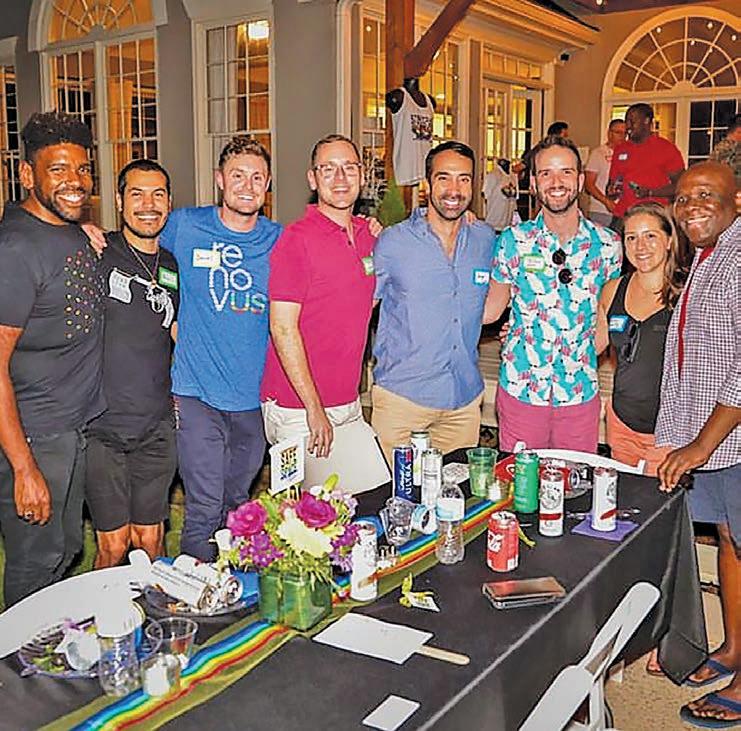
or restore,” inspiring the name for an organization aiming to restore Christian acceptance and teachings about LGBTQ in a churchless setting. Small groups are held in members’ homes, which Executive Director Daniel Youmans says makes people feel at ease and creates a safe space for newcomers. Youmans said he and his peers were “hungry” for a sense of community, authenticity and belonging when they found Renovus.
“Renovus exists to be a place where people can show up as their authentic selves and come together in mutual faith to grow
together to reclaim their faith and to develop their faith walks,” he said in an interview with Georgia Voice.
The Williams Institute found that almost twothirds of Christian-raised LGBTQ people do not identify as Christian as adults. Co-author Ilan Meyer wrote, “The heightened experience of minority stressors within Christian environments may contribute more to stigma than support, leading them to distance themselves from their religious faith and communities, sometimes seeking LGBTQaffirming religious or spiritual environments.”
“I finally had this connection that I never had before, that I never knew existed,” Daniel Bennett, a Renovus member, shared in a testimonial. “I was able to, for the first time, have both parts of my life come together.”
At minimum, LGBTQ Christians are looking for spaces that accept their identity. Pew Research Center sampled over 25,000 Christians and found that the majority believe homosexuality should be accepted, but at just 58 percent in favor of acceptance, there is a long road of reformation ahead.
Renovus allows LGBTQ people looking to explore their faith and engage with small groups of 10-15 intergenerational and interfaith members weekly in Atlanta neighborhoods and surrounding metro areas. Beyond acceptance, LGBTQ people are celebrated for showing up authentically to discuss the Bible, its teachings, and the complex relationship many queer people have with religion.
“I wasn’t even looking for Renovus. I was just looking for acceptance from other people, because at this point [in my life] … I wasn’t looking for a relationship with God.” Kellie, a Renovus member, recalled in a testimonial. “When I walked in that room it was not about me being trans. I was accepted by so many people in Renovus.”
In addition to weekly small groups in and around Atlanta, Renovus will host Katherine Johnson from The Reformation Project as she explores LGBTQ affirmation in the Bible at the Renovus Real Talk 2024 on Sunday, March 24. To reserve a spot for Renovus Real Talk 2024, visit eventbrite.com/e/renovus-real-talk2024-tickets.
12 COMMUNITY MARCH 22, 2024 THEGEORGIAVOICE.COM
Adalei Stevens
COMMUNITY
Members of Renovus at a backyard BBQ event PHOTO BY @RYLPHOTO
Life as a Queer Muslim
Divine Ikpe, with assistance from Katie
Burkholder
A 2016 study done by the University of Minnesota found that Muslims were the most disliked and distrusted “cultural outsider” group in the United States. For queer Muslims, the stigma they face is twofold: Islam can pose issues for queer members of the faith, and queer nonMuslims can mask xenophobia as concern about the homophobia they believe to be inherent to the faith — often motivated by unnuanced stereotypes.
The realities of living as a queer Muslim are nuanced. In an interview with Georgia Voice, a 22-year-old nonbinary queer Muslim — who requested to remain anonymous — spoke about their experiences.
Quotes have been edited for clarity.
Where are you from? How was your life growing up? How religious was your family?
I’m from Ontario, Canada, like near Toronto. Growing up ,there are definitely things that stand out to me as being really bad, but overall I really think my upbringing wasn’t awful. I try to be the best person I can be, and I think those values were instilled in me from the way I was brought up. My family is quite religious, but they also cherrypick a lot, you know? There are things they let go, there are things that they hold really tight. It just depends on what it is and how the cultures they grew up in.
How would you describe the evolution of your religious practice?
I think that there’s things I’ve let go of since getting older. I hold a lot of the values still from my religious upbringing, but I don’t really pray five times a day, and I will bend the rules for sure if I want to do something or feel something.
What values from childhood do you still hold?
Having faith in God, following this religion’s path, and reading the Quran. There are
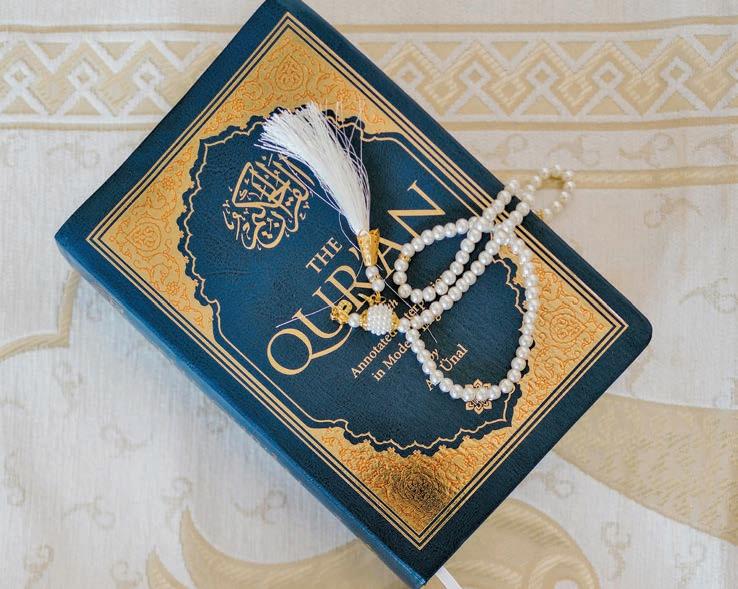
other values instilled in me like being a good person. As part of the religion you have to donate a lot: there are percentages of your entire income that you have to donate. So, I do that, I practice that very often.
Are you out to your religious community? If yes, how do people treat you? If no, do you fear how people will treat you?
So, weird answer … basically to my family, it’s unspoken. I know that they know. My parents have had talks about the queer community and my friends that are gay and they definitely don’t approve, they’re not chill with that. But it has come to this point where I’ve had so many things happen to me in this point in my life that my parents are like, “You’re still our child, despite whatever it is you got going on.”
I’m also active in a lot of pro-Palestine activism in my area, and the majority of the people involved in those protests are also Muslim. I’m completely out to every single one of them, and they have treated me with so much kindness and respect. They either
think it’s cool or don’t care at all. They’re like, “Okay you're gay, that’s great, can you help me with this?” which I really appreciate. I appreciate that indifference, because having that fear of what if somebody treats me badly to this person doesn't give a shit like, at all.
Are the people you interact with in your activist groups a wide age range or closer to your age?
There is a wide age range, but yeah, most of the people I interact with are more my age.
Do you find any difference in acceptance of queerness with older Muslim people that you know?
I think it depends on the circle that you’re in. I work in a nonprofit space and so you have to have that openness and acceptance built in, so the older Muslim people that I meet in this space are super accepting. They’re very encouraging and want to talk about it — but then my dad’s friends that go to the mosque every day, I would never tell them that I was queer. I just wouldn’t. If we have family and friends over or other people in the community,
“Having faith in God, following this religion’s path, and reading the Quran. There are other values instilled in me like being a good person. As part of the religion you have to donate a lot: there are percentages of your entire income that you have to donate. So, I do that, I practice that very often.”
I hear transphobia and homophobia brought up and I’m like, “Well I can’t come out here, for sure.” Yeah, it definitely depends on who you’re interacting with.
In your experience, how have your religion and your queerness intersected or clashed? I think they intersect in the sense that — this is gonna sound a little corny — but my queerness feels divine to me. It’s just how God made me, and I have this deep love and appreciation for women and nonmen especially if I’m in relation with them because to me, this is the most right feeling in the world, and I cannot imagine it being a sin. It just feels so correct, like I’m supposed to be doing this. When I pray, I pray for (God Willing) a future where I have a wife someday. The only time they clash is when someone who identifies as a Muslim comes up to me and says, “You’re going to hell, this is a sin.” And I’m like, “First of all, been there, don’t care,” and the whole point is to be religious, pray to God, have your faith. I don’t understand why you would ever try and push someone away from faith, I’ve never understood that. It just feels so right to me, I just can’t imagine getting punished for it.
THEGEORGIAVOICE.COM MARCH 22, 2024 COMMUNITY 13
COMMUNITY
Queer Muslims can face stigma from both other Muslims and other queer people. PHOTO BY PEXELS.COM
Atheists and the LGBTQ Community
Katie Burkholder
Religion offers many community support and peace, the faith of believing that some greater entity has your back. But, as the LGBTQ community knows well, religion can have a dark side, too. Bigoted ideology pushes many people out of the religion they were raised in, and like the LGBTQ community, those who do not believe in God are sometimes labeled as degenerate and immoral by religious folks and treated as such.
While the struggles are not the same, queerness and atheism find coexistence in stigma, the fight against religious dogma intruding on politics, and the need for community.
Overlap
LGBTQ people are more likely to be nonreligious than the general public: 48 percent reported having no religious affiliation in a survey done by the Pew Research Center, compared to 20 percent of the general public. On the flip side, atheists are overwhelmingly accepting of the LGBTQ community; 94 percent said “homosexuality should be accepted,” also according to Pew, compared to 62 percent of the general public.
According to PRRI research, 30 percent of people who left their previous religious affiliation did so because of “negative religious teachings about or treatment of LGBTQ people,” and as “religious freedom” continues to be used as an excuse for discrimination against the LGBTQ community, its opposition finds allies in the atheist community.
“[New Atheists] believe that society will be more just, more prosperous and more peaceful when elected officials can set policy based simply on a reasoned weighing of the evidence, and not appeals to scripture,” atheist Adam Lee wrote for Salon. “Thus, our claim is that by weakening the power of religion, both religious liberals and secular humanists stand to gain.”
The overlap between communities is unsurprising when you consider the historical
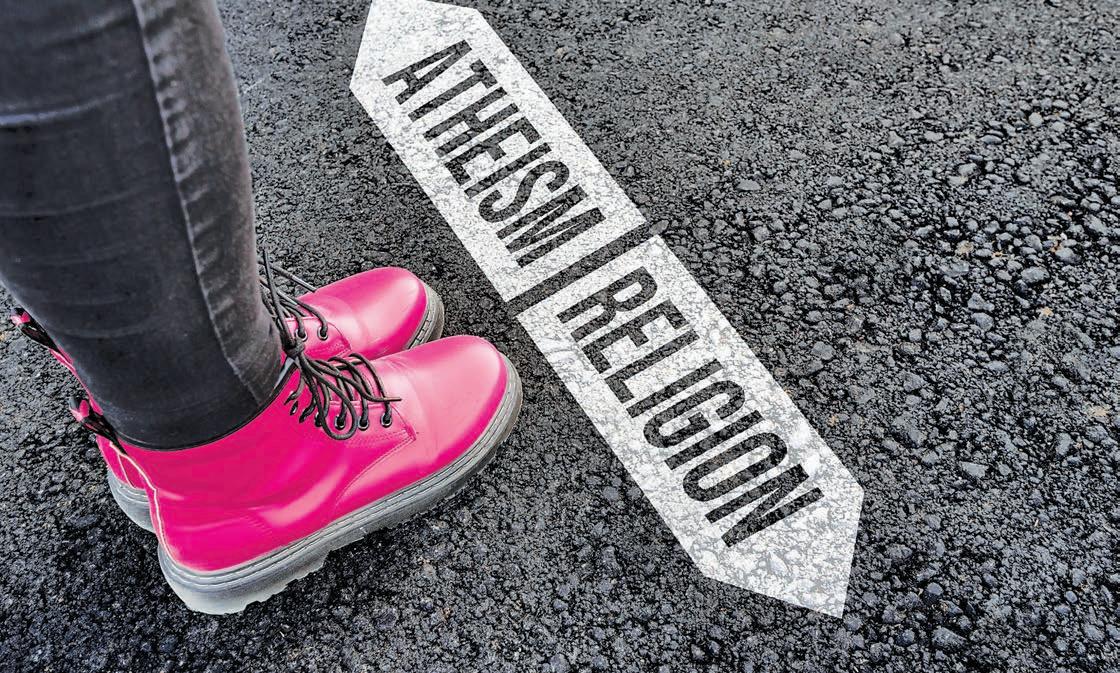
religious attitudes toward both same-sex relationships and nonbelievers. Religious stigma unites the LGBTQ and atheist communities; while queer people often face the stigma and disgust of being labeled “sinner,” atheists are often similarly treated as immoral. In fact, 2016 research from the University of Minnesota found that 42 percent of people believed atheists “do not at all agree with my vision of American society” and 43.7 percent said they would “disapprove of an atheist marrying their child.” These stigmas may lead to mental health issues, as both groups are more likely to attempt suicide than their counterparts, according to studies published in the Journal of Homosexuality and American Journal of Psychiatry.
Distinctions
While the overlap between the LGBTQ and atheist communities is significant, there are still many religious queer people — for whom, as queer atheist Camille Beredjick argues in her book, “Queer Disbelief: Why
LGBTQ Equality is an Atheist Issue,” atheists should still advocate.
“I do not need to be freed from the Catholic Church,” Bryan, a Catholic trans man, told Beredjick in an interview for the book. “I am a devout man who really can make a difference in my community. I would not feel freer without religion. I have tried it, and I felt lost and alone without it. Please do not pity me or look down on me. I know the Catholic Church is imperfect, but it is mine and I love it deeply.”
Furthermore, many atheists are clear that when it comes to stigma, anti-atheist sentiments rarely manifest in the same ways homophobic and xenophobic stigmas do and should not be equated.
“Personally speaking, I rarely fear for my safety as an atheist in the U.S., but I frequently do as a queer person,” gay atheist Chris Stedman told Religion News Service. “I have been physically
assaulted for being queer, and many of my Muslim and Jewish friends have also been the victims of hate crimes. This is not to say that anti-atheist hate crimes do not happen, but statistically they are extremely less common.”
Finding Community
However, while anti-atheist stigma may not necessarily be life-threatening, it is still damaging, and since atheism is not often organized around, atheists may lack the community and support from other atheists that religion offers.
If you’re an atheist looking for community, resources you can turn to include Dare to Doubt, a hub for people detaching from harmful belief systems; American Atheists, the premier organization fighting for the civil liberties of atheists since 1963; and the American Humanist Association. The Atlanta Atheists meetup group also meets monthly around the metro area; the next meeting is on March 24 at Steinbeck’s in Decatur.
14 COMMUNITY MARCH 22, 2024 THEGEORGIAVOICE.COM
COMMUNITY
PHOTO BY SHUTTERSTOCK.COM/GAGODESIGN

Mae Cowdery (1909–1953), Harlem Renaissance Era
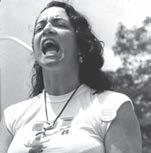
This story? It's a little unbelievable, but true. A schoolgirl makes it into the Big Time as a well-regarded Harlem Renaissance-era poet, but then drops from sight, to emerge in upper-class Black Philadelphia life as a matron, a sigh marking her death by suicide at age 44.
Mae was born in 1909 Philadelphia, the only child of a solidly middle-class, aspirational Black family. Her mother was a teacher and assistant director at the Bureau for Colored Children; her father, a postal worker and caterer.
Philadelphia was an intensely segregated city, and its Black society was ruled by a difficultto-break-into class, dubbed “The Talented Tenth” by W.E.B. Du Bois.
In grammar school, they discovered Mae was very bright. Mae discovered a love and talent for poetry.
Philly was one of many U.S. cities creating Black cultural ferment, today coded within the concept we call “The Harlem Renaissance.” Yet Harlem wasn’t the only place where Black gold bubbled up in a heady mix of new art. That art included many things: art for art’s sake, activist art, art providing sustenance, artists as visionaries.
While Mae was still attending the prestigious Philadelphia High School for Girls, she joined the adult Black literati of Philly by
“Mae published a lot and befriended other Renaissance artists. Her Modernist work evolved, and artistactivist material gave way to a deeply unapologetic sensuality, sometimes tempered by loss and heartache.”
publishing poems in the highly regarded Black Opals (Black Opals being both the name for the group and its quarterly journal). She wrote to Langston Hughes and asked him to mentor her, which he agreed to do.
In her senior year, Mae blazed into the swirling, upending world of this arts movement when she won a poetry contest in The Crisis, the magazine of the NAACP. Mae moved to New York to attend the Pratt Institute and split her time between Greenwich Village (lesbians!) and Harlem (all kinds!), arguably the two queerest places on the continent at the time.
Maureen Honey describes a Crisis photo of this 19-year-old in her book, “Aphrodite’s Daughters: Three Modernist Poets of the Harlem Renaissance,” saying she possessed “unusual beauty, style, and originality with a bow tie, tailored jacket, and very short hair.”

Mae published a lot and befriended other Renaissance artists. Her Modernist work evolved, and artist-activist material gave way to a deeply unapologetic sensuality, sometimes tempered by loss and heartache.
However, not content to publish in other people’s rags, she managed to do what so very few Black women accomplished in the first half of the 20th century: she published her own book of poetry, the critically well-received “We Lift Our Voices and Other Poems” (1936).
It is always dangerous to impute muses for poems, but the desire for a woman seems inherent here:
If her lips were rubies red,/Her eyes two sapphires blue,/Her fingers ten sticks of white jade/Coral tipped … and her hair of purple hue/Hung down in a silken shawl … /They would not be enough/to fill the coffers of my need.
-excerpt from “Insatiate”
The poet/teacher Stanley Braithwaite dubbed her work that of “a fugitive poet.” But following all the attention, her rather public (and supposedly bisexual) life dissolved. She returned to Philly, married “up,” shed one husband for another, all the while taking on the expected roles of a proper matron with
husband, daughter, debutante cotillions, a bit of philanthropy, and the first “Jack and Jill” school established in the U.S. (membership in these 230+ storied schools, which have produced some of the most influential, networked and moneyed professional Black people in the U.S., was by invitation only).
Black Society columns featured her in these roles. The picture? Mae in pearls, a fashionable dress, and heels.
The artist Richard Long met her in the early 1950s and exclaimed: “She seemed a bright intelligence made bored and restless by her surroundings.” Jessie Fauset’s Philadelphian brother Arthur Huff Fauset called her “a flame that burned out rapidly … a flash in the pan with great potential who just wouldn’t settle down.”
None of which explains why she used her gas stove to take her own life at the age of 44.
Mae published a total of 62 poems in all, including the ones in her book. It would be difficult to select a few signifying words from her cannon. But let us end with her promise:
My words shall drip like molten lava ... The lava from the black volcano
16 COLUMNIST MARCH 22, 2024 THEGEORGIAVOICE.COM
María Helena Dolan
REELING IN THE YEARS MARÍA HELENA DOLAN
Mae Cowdery HISTORICAL PHOTO
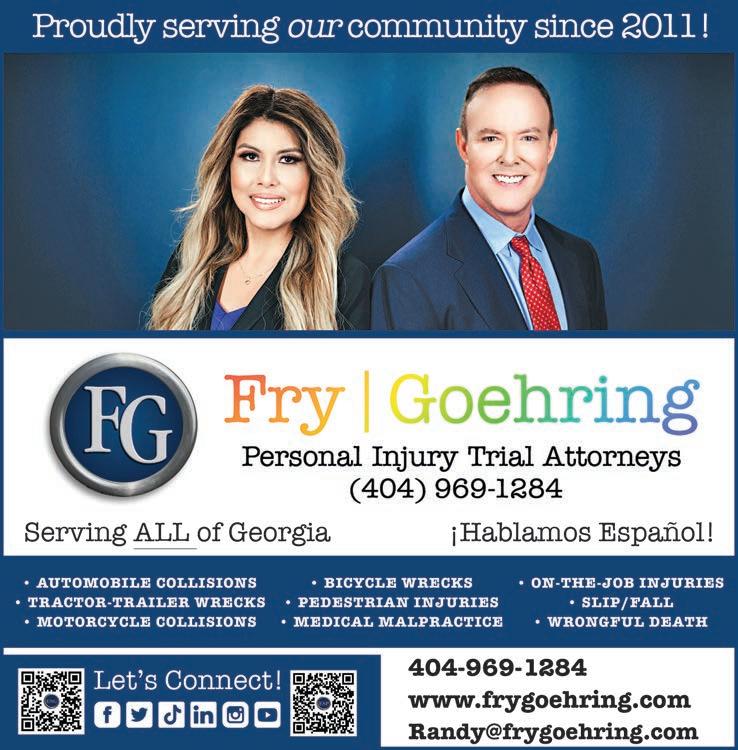


THE TOWERS AT UPTOWN ATLANTA BUCKHEAD APRIL 18
THUR · 6-10PM
UNLIMITED WINGS · CRAFT BEER · WINE COCKTAIL TASTINGS · DJ TRON





THEGEORGIAVOICE.COM MARCH 22, 2024 ADS 17
Q-Music: Listen to the Songs She Sings
New queer music to listen to for Women’s History Month
Gregg Shapiro
While there isn’t anything on “Nothing’s Gonna Stand In My Way Again” (Bloodshot Records) as unexpectedly funky as “Heaven” from her 2016 album “Real,” Lydia Loveless does take her fans in some new and exciting directions. An alt-country diva of the highest order, Loveless leans more toward "alt" on these 10 songs. However, she never completely abandons the twang or the trill on “Poor Boy,” “Sex and Money,” “Toothache,” and “Do The Right Thing.” Loveless is also capable of creating beautifully soulful tunes, as is evident on “Summerlong,” “Runaway” and “Ghost.”
On her 2022 album, “Laurel Hell,” Mitski explored synth-pop, giving listeners two irresistible dance tracks: “The Only Heartbreaker” and “Stay Soft.” Her new album, “The Land Is Inhospitable and So Are We” (Dead Oceans) is a more organic effort and even features pedal steel guitar (“I Don’t Like My Mind,” “Heaven,” and “The Frost”). There is also a lushness, represented by the presence of a choir (“Bug Like An Angel,” “My Love Mine All Mine”), strings (“The Deal,” “Heaven”), brass and woodwinds (“When Memories Snow”). All

in all, “The Land Is Inhospitable and So Are We” is a stunning effort by an artist who never fails to dazzle us.
Winner of the 2023 Polaris Music Prize, Debby Friday is a Canadian electronic music artist who clearly made an impression with her debut album, “Good Luck” (Sub Pop). It’s easy to see how, beginning with the empowering titular opening track, which sounds like it arrived from the future via musical time machine. “So Hard To Tell” is forward-looking soul music, and “I Got It,” featuring Uñas, and “Hot Love,” are rapidfire club bangers that are sure to wear you out. Friday’s talent for experimentation can

be experienced on “Safe” and “Pluto Baby.”
If fans of the aforementioned Mitski, as well as Sharon Van Etten, Weyes Blood, and Angel Olsen don’t already have Squirrel Flower (aka Ella Williams) in heavy rotation, they don’t know what they’re missing. “Tomorrow’s Fire” (Polyvinyl) begins with the gorgeous, layered vocals of opener, “i don’t use a trash can,” in which she vows not to change her sheets, possibly a reference to love that was that good. She shifts gears on the electrified songs, “Alley Light” (which has a kind of queer energy), “Full Time Job,” “Stick,” and “Intheskatepark,” before ending on the gently acoustic note of “Finally Rain.”
The most delightful female-led Japanese band since Pizzicato Five, Shonen Knife, Cibo Matto, or Puffy AmiYumi, Chai is bound for the club on its new eponymous Sub Pop album. You’d be wise to follow them and drink in the fabulous, spicy, and retroinspired dance numbers, such as “Game,” “From 1992,” “Like, I Need,” “Karaoke,” “Para Para,” and “Neo Kawaii, K?”
Once you get past the unusual spelling of the name Spellling (aka Chrystia Cabral), you can dig into the music, which is well worth a listen. The 11-track album “Spellling & the Mystery School” (Sacred Bones) is a reimagining of songs from her previous releases, including 2017’s “Pantheon of Me,” 2019’s “Mazy Fly,” and 2021’s “The Turning Wheel.” Proving that Taylor Swift isn’t the only one who can pull off this sort of thing, Spellling’s new versions of “Always,” “Under The Sun,” “They Start the Dance,” “Haunted Water,” “Boys at School,” “Revolution,” and “Phantom Farewell” really sing!
Montreal-based La Force (aka Ariel Engle) has a musical style reminiscent of fellow Canadian Feist. This makes sense when you discover that, like Feist, La Force has performed with Broken Social Scene. To be clear, La Force is her own person, and distinctive songs such as “outrun the sun,” “how do you love a man,” “october,” “ouroboros,” and the title number go a long way toward establishing that fact.

18 CULTURE MARCH 22, 2024 THEGEORGIAVOICE.COM CULTURE
Mitski PHOTO VIA FACEBOOK
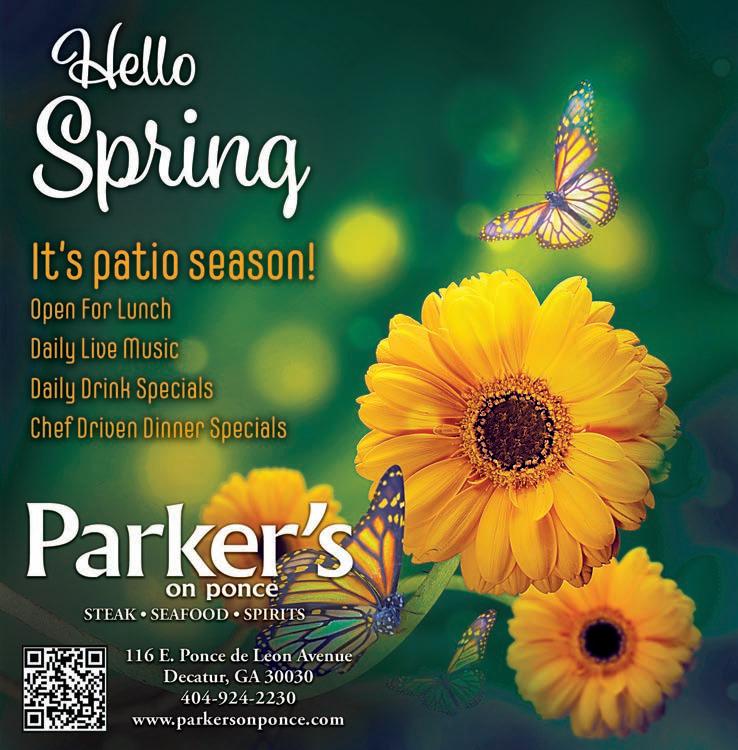


THEGEORGIAVOICE.COM MARCH 22, 2024 ADS 19
‘Frida’ and ‘Love Lies Bleeding’ Explore Queer Protagonists
Justice Smith Discusses New Film, ‘American Society of Magical Negroes’

The fascinating new documentary, “Frida,” directed by Carla Gutierrez, paints a picture of the legendary painter and queer icon, Frida Kahlo. It’s told largely in Kahlo’s own words and writing (as well as the words of those around her), using a wealth of archival and personal material. Gutierrez, making her feature directing debut, has long been a fan and feels Kahlo was very straightforward about being bisexual.
“She was very open about it — she put it in her paintings,” said the director. “She sent out letters and talked about it in her private closed community. There is some film of her where that attraction is shown publicly. We wanted to express that in the same way — just put it out there. She didn’t shy away from it, but she was also not trying to explain it or defend it in any way. She was expressing it
very naturally. That is a beautiful thing that we wanted to capture in the film.”
In doing her research, the director discovered much more about the artist, including her parents’ acceptance of her.
“The pictures that you see of her with men’s suits and her hair back looking very masculine — those pictures were taken as family pictures,” Gutierrez said. “She dressed like that and the pictures were taken by her father. She had that space to really show herself.”
Her work is revered now, but Kahlo was in an era where her work was not widely appreciated.
“She was not known,” Gutierrez said. “She was known as a figure in Mexico, but it was not because of her art. She was a celebrity and a figure being Diego Rivera’s wife and being who she was in public and how she presented
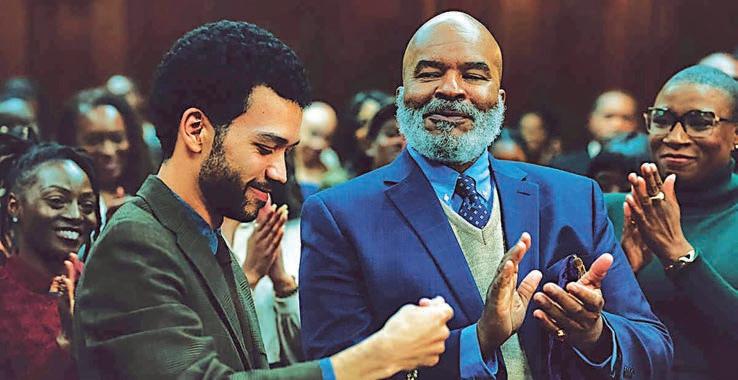
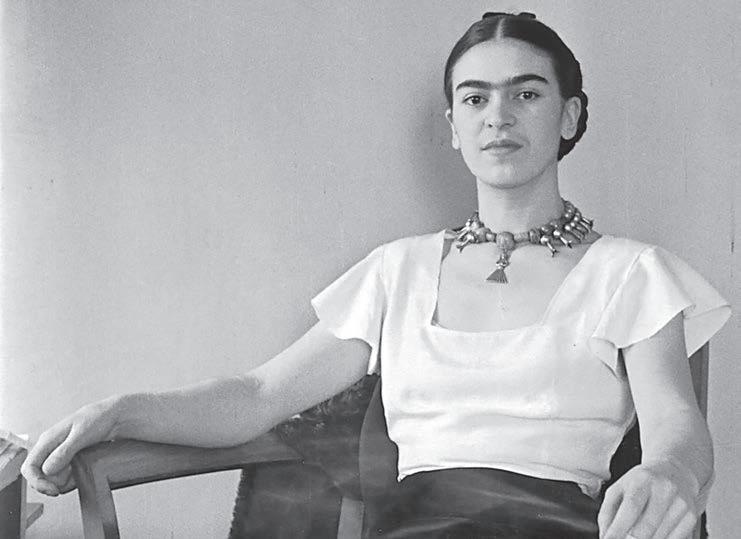
herself. But her art really was not well known. Even after her death people that were studying her were looking for the people who owned her paintings because they were in private collections and people did not know where her paintings ended up.”
The new comedy, “The American Society of Magical Negroes” is a satire about Aren, a young man who unexpectedly finds himself recruited into an organization of magical Black people who are dedicated to disrupting the lives of white people. It’s based on the trope of the "magical negro" character, generally a supporting character who comes to the assistance of a white character. Performer Justice Smith, known for work in TV’s “Generation” and films such as “Dungeons & Dragons: Honor Among Thieves” and “Jurassic World: Fallen Kingdom,” plays Aren. Smith came out as queer in 2020, although he doesn’t like the framing of coming out.
“It puts a lot of onus on the individual rather than the society that makes people feel like they can’t be their full selves,” he said. “I understood what I was doing when I ‘came out,’ but I saw it more as an invitation in — like I am inviting the public into my personal life.”
Smith feels “American Society” is a work that will resonate with an LGBTQ audience.
“I think the film is talking about being a marginalized person,” he said. “Anyone of marginalized experience has been in environments where they have had to compromise themselves in order to fit in and stay alive, either socially or physically, and I
think obviously as queer people we know that experience. There is a lot of code-switching we have to do as queer people in a straight society. I think race and queerness are very different and move in different ways, but systems of oppression usually use familiar tactics, so queer people can identify with this.”
After a splashy debut at Sundance, writer and director Rose Glass’ thriller, “Love Lies Bleeding” is now in theaters. In it, Kristen Stewart plays Lou, who manages a run-down gym in New Mexico. One day, she notices Jackie (Katy O’Brian) in the facility. Jackie is on her way to Las Vegas for a bodybuilding competition, but an immediate attraction develops between the two women. When Jackie begins working for Lou’s father (Ed Harris) and gets to know Lou’s abusive brotherin-law (Dave Franco), matters get complicated. “Love Lies Bleeding” is an erotic film that has a noirish and gritty feel. It can be rather violent at times. Glass, who made the disturbing 2021 film, “Saint Maud,” has stacked a deep ensemble. Stewart and (especially) O’ Brian are both quite believable, and their attraction and feelings for each other drive the narrative. Like “Saltburn,” the last 20 minutes go a little batshit crazy, but it’s nonetheless inspired filmmaking and a potential cult classic, balancing laughs with some shocking moments.
MORE INFO
“Frida” is now streaming on Prime Video
“Love Lies Bleeding” and “The American Society of Magical Negroes” are now in area theaters
20 COLUMNIST MARCH 22, 2024 THEGEORGIAVOICE.COM
Jim Farmer
JIM FARMER ACTING OUT
“Frida” PUBLICITY PHOTO
“The American Society of Magical Negroes” PUBLICITY PHOTO

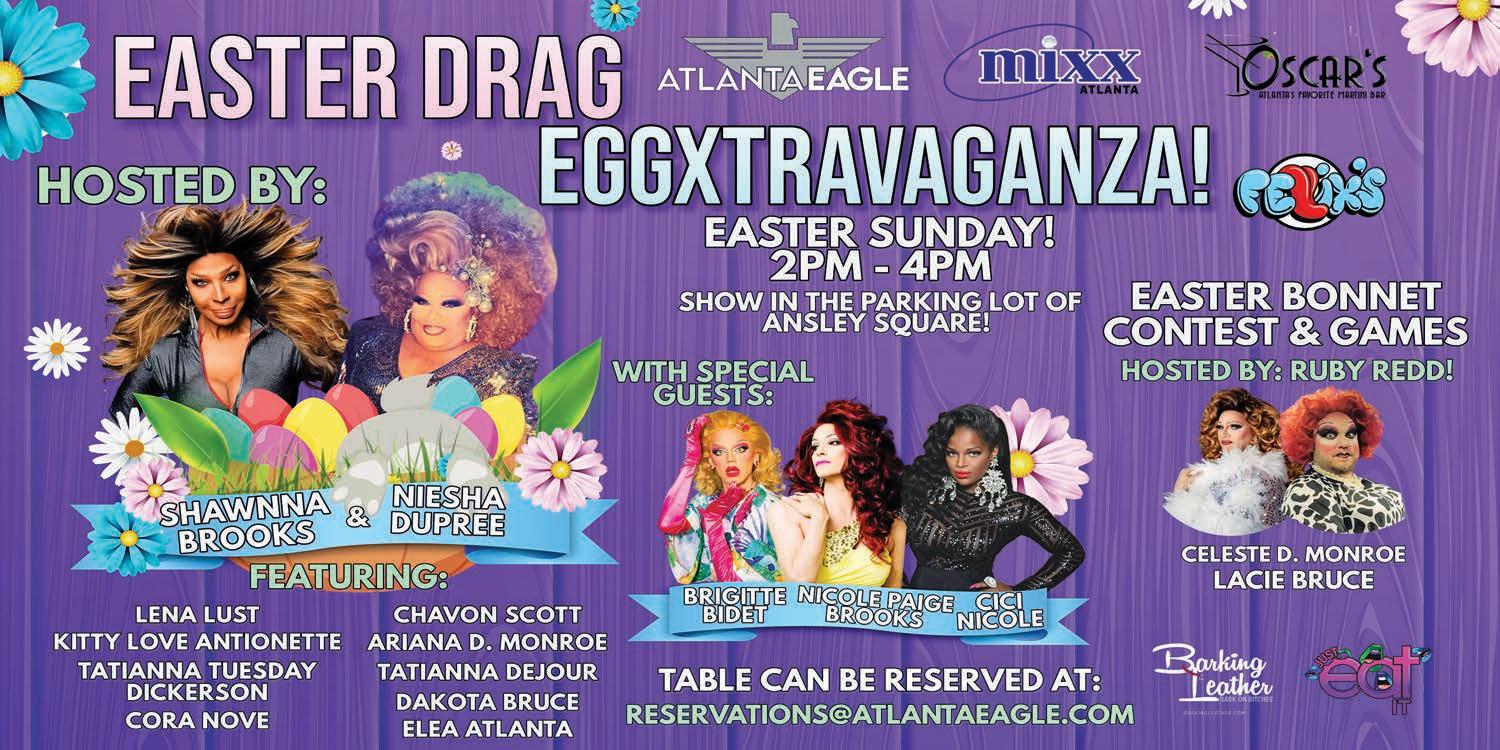
THEGEORGIAVOICE.COM MARCH 22, 2024 ADS 21
Katie Burkholder
“RuPaul’s Drag Race”
Viewing Party
MARCH 22, 8PM
ATLANTA EAGLE
Watch “Drag Race” season 16 with friends!
Myah Ross Monroe’s House of Love
MARCH 22, 9PM
ATLANTA EAGLE
Featuring Just Jermaine, Malaysia Black, Lacie Bruce, Tatiana Tuesday Dickerson, A’Jivan Avioncé Dickerson, Chavon Scott, and Jeremiah Tymes Starr. $5 cover.
Audien
MARCH 22, 10PM
DISTRICT ATLANTA
Tickets at collectivpresents.com.
Leather and Lace
MARCH 23, 4PM
ATLANTA EAGLE
Leathermen to restrain you, drag delights to entertain you! Enjoy the cigar social, $10 beer bust, or $20 margarita bust before the cabaret show at 5pm. $5 suggested donation at the door goes to the Atlanta Sisters of Perpetual Indulgence.
Mr Charlie Brown’s XXX Rated Cougars
MARCH 23, 9PM
ATLANTA EAGLE
Featuring Niesha Dupree, Misti Shores, Lena Lust, and co-host Shawnna Brooks. $5 cover.
Atlanta Disco Society XV
MARCH 23, 10PM
THE BASEMENT
An unforgettable evening of glamour, dancing, and quality disco music on the light-up dance floor. Tickets at basementatl.com.
HE.SHE.THEY.
MARCH 23, 10PM
FUTURE ATLANTA
Alley Cat Music is hosting this new weekly event! This week features tINI, Ash Lauryn, and Gabriela Gonzalez. Tickets at shotgun.live/events/he-shethey-t-ini-ash-lauryn-gabriela-gonzalez.
Sasha Colby After Party
MARCH 23, 10PM
MY SISTER’S ROOM
Catch the official after-party for Sasha Colby’s
Stripped tour, featuring performances by Ellasaurus Rex, Taylor ALXNDR, Molly Rimswell, Ruby Iman Starr, and Mrs. Ivana, plus music by DJ Michael Wulf and DJ ChloShmoney. Tickets at mysistersroom.com.
Super Collider
MARCH 23, 11PM
ATLANTA EAGLE
With DJ Mister Richard. $5 cover.
Country Night
MARCH 26, 8PM
ATLANTA EAGLE
Show up for the dance lesson before line dancing the night away with DJ Dice at 9pm!
Rock Haus Karaoke
MARCH 28, 9PM
ATLANTA EAGLE
Hosted by Raqi.
“RuPaul’s Drag Race” Viewing Party
MARCH 29, 8PM
ATLANTA EAGLE
Watch “Drag Race” season 16 with friends!
Myah Ross Monroe’s House of Love
MARCH 29, 9PM
ATLANTA EAGLE
Featuring Just Jermaine, Malaysia Black, Lacie Bruce, Tatiana Tuesday Dickerson, A’Jivan Avioncé Dickerson, Chavon Scott, and Jeremiah Tymes Starr. $5 cover.
HYO of Girls Generation
MARCH 29, 10PM
DISTRICT ATLANTA
Tickets at collectivpresents.com.
Amanda Tori Meating and Loosey LaDuca
MARCH 30, 8PM
MY SISTER’S ROOM
“RuPaul’s Drag Race” queens Amanda Tori Meating and Loosey LaDuca headline this incredible lineup of performers, including Ada Manzhart, Boudreaux, Drew Friday, Ellasaurus Rex, Minty, and Ran Diosr. Tickets at mysistersroom.com.
Mr Charlie Brown’s XXX Rated Cougars
MARCH 30, 9PM
ATLANTA EAGLE
Featuring Niesha Dupree, Misti Shores, Lena Lust,
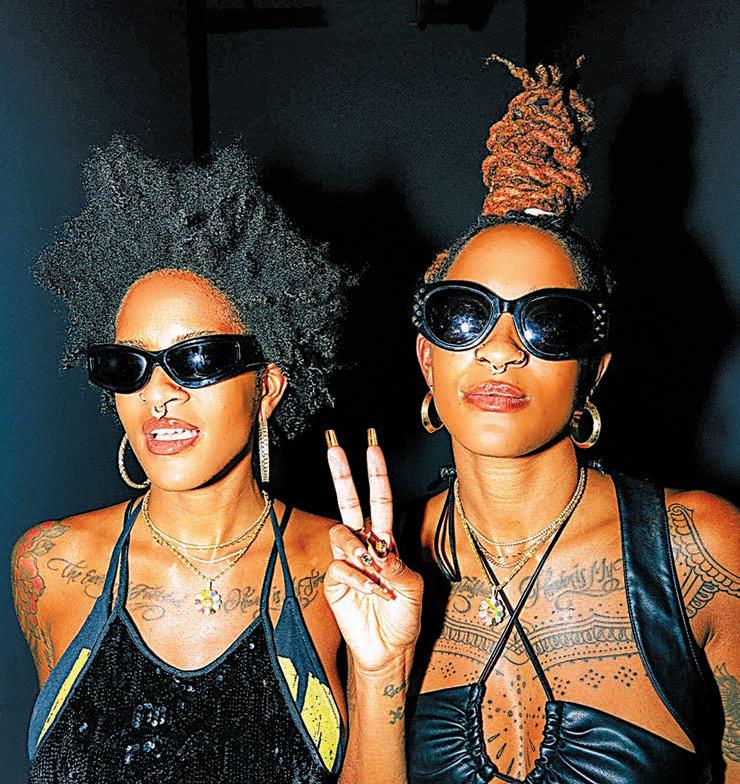
EVENT SPOTLIGHT
Coco & Breezy
APRIL 5, 10PM
DISTRICT ATLANTA
Tickets at bit.ly/COCOBREEZEATL2024. Photo via Facebook
and co-host Shawnna Brooks. $5 cover.
T4T: A Trans and Non-binary Dance Party
MARCH 30, 10PM
LOCATION PROVIDED WITH RSVP
Southern Fried Queer Pride hosts this dance party for the trans community! Featuring DJ sets by Abby Dear, Jsport, and Zaida Zane and performances by JayBella Bankz, Koochie Koochie Ku, Lola Mami, Mr. Elle Aye, and Taylor ALXNDR. Plus: free HIV and STI testing, a pop-up selfie photo booth, and specialty cocktails and mocktails! Tickets at sfqp.info/t4t24.
REVIVAL
MARCH 30, 11PM
ATLANTA EAGLE
Featuring music by Brady Price. $10 cover.
Rock Haus Karaoke
APRIL 4, 9PM
ATLANTA EAGLE
Hosted by Raqi.
Coco & Breezy
APRIL 5, 10PM
DISTRICT ATLANTA
Tickets at bit.ly/COCOBREEZEATL2024.
Ron Pullman
APRIL 5, 11PM
ATLANTA EAGLE
$5 cover.
22 LGBTQ NIGHTLIFE FORECAST MARCH 22, 2024 THEGEORGIAVOICE.COM
LGBTQ NIGHTLIFE FORECAST MARCH 22-APRIL 5





 Katie Burkholder
Katie Burkholder











































































